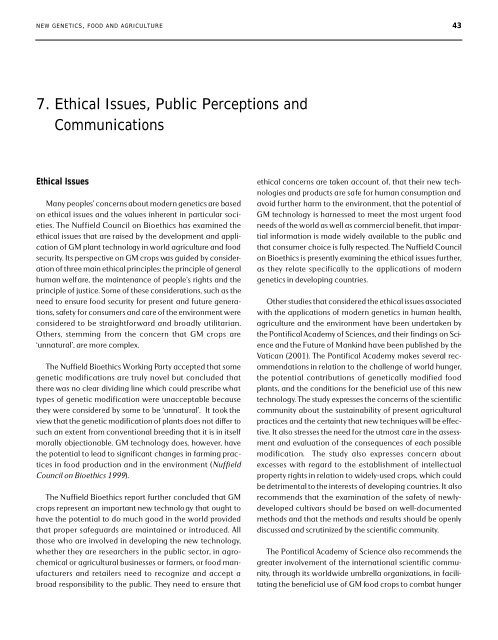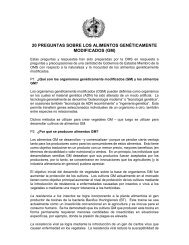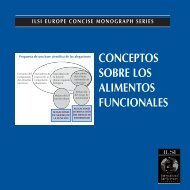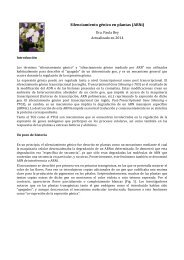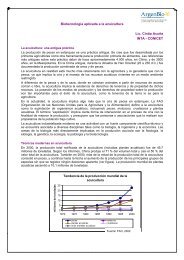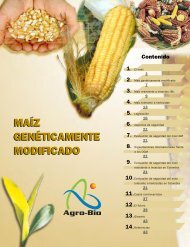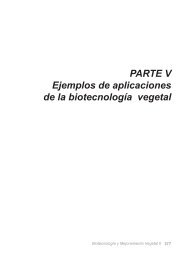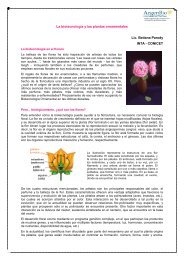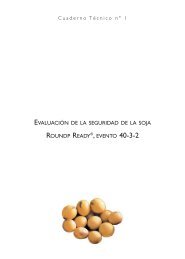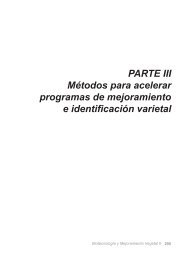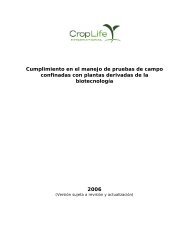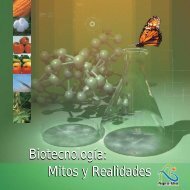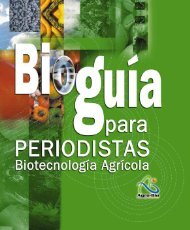New Genetics, Food and Agriculture: Scientific ... - ArgenBio
New Genetics, Food and Agriculture: Scientific ... - ArgenBio
New Genetics, Food and Agriculture: Scientific ... - ArgenBio
Create successful ePaper yourself
Turn your PDF publications into a flip-book with our unique Google optimized e-Paper software.
N E W G E N E T I C S, F O O D A N D A G R I C U LT U R E 437. Ethical Issues, Public Perceptions <strong>and</strong>CommunicationsEthical IssuesMany peoples’ concerns about modern genetics are basedon eth i cal issues <strong>and</strong> the va l u es inherent in par ti cu l ar soc i-e ti es. The Nuffield Co uncil on Bioe th i cs has examined th eethical issues that are raised by the development <strong>and</strong> applicationof GM plant technology in world agriculture <strong>and</strong> foodsecurity. Its perspective on GM crops was guided by considerationof three main ethical principles: the principle of generalhuman welfare, the maintenance of people’s rights <strong>and</strong> theprinciple of justice. Some of these considerations, such as theneed to ensure food secur i ty for present <strong>and</strong> future generations,safety for consumers <strong>and</strong> care of the environment wereco n s i d e red to be strai g h tfo rward <strong>and</strong> broa dly uti l i tar i an .Oth e rs, stemming from the co n cern th at GM crops are‘unnatural’, are more complex.The Nuffield Bioethics Working Party accepted that someg e n e tic mod i fi cations are truly novel but concluded th atthere was no clear dividing line which could prescribe whattypes of genetic mod i fi cation we re un a cce p ta ble be ca us ethey were considered by some to be ‘unnatural’. It took theview that the genetic modification of plants does not differ tosuch an extent from conventional breeding that it is in itselfm o rally ob j e c ti o n a ble. GM te c h n ol ogy does, howeve r, havethe potential to lead to significant changes in farming practices in food produ c tion <strong>and</strong> in the env i ronment (Nuffi el dCouncil on Bioethics 1999).The Nuffield Bioethics report further concluded that GMcrops represent an important new technolo gy that ought toh ave the po te n tial to do much good in the world prov i d e dth at pro per safe g u ards are mai n tained or introdu ced. Al lthose who are invol ved in developing the new te c h n ol ogy,wh e ther th ey are res e arc h e rs in the public secto r, in agrochemicalor agricultural businesses or farmers, or food manufac ture rs <strong>and</strong> re tai l e rs need to re cogn i ze <strong>and</strong> accept ab road res po n s i b i l i ty to the public. They need to ensure th ate th i cal co n cerns are ta ken acco unt of, th at their new te c h-nologies <strong>and</strong> products are safe for human consumption <strong>and</strong>avoid further harm to the environment, that the potential ofGM te c h n ol ogy is har n essed to meet the most urgent foodneeds of the world as well as commercial benefit, that impartialinfo r m ation is made widely avai l a ble to the public an dthat consumer choice is fully respected. The Nuffield Councilon Bioethics is presently examining the ethical issues further,as th ey re l ate spe c i fi cally to the appl i cations of mod e r ngenetics in developing countries.Other studies that considered the ethical issues associatedw i th the appl i cations of modern geneti cs in hum an health ,a gr i cu l ture <strong>and</strong> the env i ronment have been un d e r ta ken bythe Pontifical Academy of Sciences, <strong>and</strong> their findings on Science<strong>and</strong> the Future of Mankind have been published by theVati can (2001). The Po n ti fi cal Aca d e my makes seve ral re c-ommendations in relation to the challenge of world hunger,the po te n tial co n tr i b utions of geneti cally mod i fied foodplants, <strong>and</strong> the conditions for the beneficial use of this newtechnology. The study expresses the concerns of the scientificco m m un i ty abo ut the sus tai n a b i l i ty of present agr i cu l tura lpractices <strong>and</strong> the certainty that new techniques will be effective.It also stresses the need for the utmost care in the assessment<strong>and</strong> eva l u ation of the co n s e q u e n ces of each po s s i bl em od i fi cation. The stu dy also expres s es co n cern abo ute xces s es with re g ard to the es ta bl i shment of inte l l e c tu a lproperty rights in relation to widely-used crops, which couldbe detrimental to the interests of developing countries. It alsore commends th at the exam i n ation of the safe ty of newl y -d eve l o ped cu l tivars should be based on we l l - d ocum e n te dmethods <strong>and</strong> that the methods <strong>and</strong> results should be openlydiscussed <strong>and</strong> scrutinized by the scientific community.The Pontifical Academy of Science also recommends thegre ater invol vement of the inte r n ational scienti fic co m m u-nity, through its worldwide umbrella organizations, in facilitatingthe beneficial use of GM food crops to combat hunger


